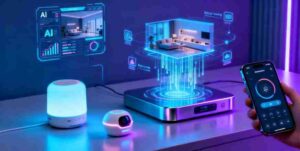The landscape of healthcare is undergoing a profound transformation, and at the heart of this revolution lies the paradigm-shifting domain of digital health diagnostics. In an era where technology continues to advance at an astonishing pace, the potential for digital health diagnostics to reshape the way we approach healthcare is nothing short of extraordinary. In this comprehensive exploration, we will delve into the world of digital health diagnostics, highlighting the latest advancements, groundbreaking technologies, and transformative trends that are driving innovation in healthcare delivery, patient diagnosis, and treatment. Join us as we unveil the promising potential of digital health diagnostics and the future it promises to shape.

The Evolution of Healthcare Diagnosis
Traditionally, healthcare diagnosis has often been a resource-intensive and time-consuming process, with patients enduring lengthy waits for test results and diagnosis. However, digital health diagnostics is revolutionizing this landscape, offering rapid, efficient, and patient-centric solutions.
1. Advancements in Remote Monitoring
One of the most significant contributions of digital health diagnostics is remote monitoring. Wearable devices and connected health platforms now allow healthcare providers to monitor patients’ vital signs, chronic conditions, and overall health in real time. This not only enables early detection of health issues but also fosters proactive intervention, improving patient outcomes.
2. Telemedicine and Telehealth
Digital health diagnostics has paved the way for telemedicine and telehealth services, where patients can access medical consultations and diagnosis remotely. This not only enhances access to healthcare for individuals in remote areas but also reduces the burden on healthcare facilities, particularly in times of crises.
3. Point-of-Care Testing
Digital health diagnostics has given rise to point-of-care testing devices that provide rapid and accurate results at the patient’s side, eliminating the need for time-consuming laboratory tests. These devices are particularly valuable for diagnosing infectious diseases, managing chronic conditions, and enabling immediate decision-making by healthcare professionals.
Innovative Technologies Shaping the Future
Several groundbreaking technologies are at the forefront of digital health diagnostics, each contributing to a more precise, efficient, and patient-centric healthcare system.
1. Artificial Intelligence (AI) and Machine Learning (ML)
AI and ML algorithms are transforming healthcare by analyzing vast amounts of medical data, identifying patterns, and making predictions. These technologies assist in diagnosing diseases, predicting patient outcomes, and personalizing treatment plans based on individual patient data.
2. Internet of Things (IoT)
IoT devices, such as smart wearables and home health monitoring equipment, are interconnected to provide continuous health data. This data allows healthcare providers to monitor patients remotely, adjust treatment plans in real time, and intervene when necessary.
3. Genomic Sequencing
Advancements in genomic sequencing enable personalized medicine, allowing healthcare providers to tailor treatments and medications to a patient’s unique genetic makeup. This precision approach not only enhances treatment effectiveness but also minimizes adverse effects.
The Road Ahead: Transformative Trends
As we gaze into the future of healthcare, several transformative trends in digital health diagnostics are poised to shape the industry:
1. Predictive Analytics
Predictive analytics will play a central role in healthcare, allowing providers to anticipate patient health issues and intervene proactively. This shift from reactive to proactive care will result in better outcomes and reduced healthcare costs.
2. Enhanced Cybersecurity
With the increasing reliance on digital health data, ensuring robust cybersecurity measures will be paramount to safeguard patient information and maintain trust in the healthcare system.
3. Telehealth Integration
Telehealth services will continue to expand and integrate seamlessly with traditional healthcare delivery, providing patients with a range of options for accessing care.
Conclusion: The Bright Horizon of Digital Health Diagnostics
Digital health diagnostics is ushering in a new era of healthcare—one that is patient-focused, data-driven, and technologically empowered. The potential for rapid, accurate diagnosis, proactive treatment, and personalized care is boundless. As we venture into this bright horizon, collaboration between healthcare providers, technologists, policymakers, and patients will be essential to ensure that the transformative potential of digital health diagnostics is harnessed to its fullest. Together, we are forging a future where healthcare is not just more efficient but also more compassionate and precise, ultimately improving the lives of patients worldwide. The journey has begun, and the future of healthcare is looking brighter than ever.








MAKECOMMENT